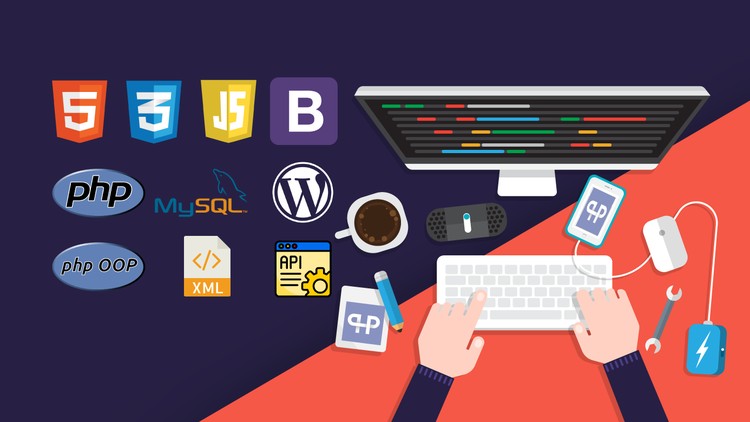The Ultimate Guide to Becoming a Full Stack Developer in 2024: A Comprehensive Roadmap to Success

Introduction:
In today’s rapidly evolving tech landscape, full stack developers have emerged as indispensable assets for businesses seeking to build dynamic, scalable, and user-friendly web applications. With expertise in both front-end and back-end development technologies, full stack developers possess a diverse skill set that enables them to design, develop, and deploy end-to-end solutions. If you aspire to become a full stack developer in 2024, this comprehensive guide will provide you with a roadmap to success, equipping you with the knowledge, skills, and resources needed to thrive in this dynamic field.
Understanding the Role of a Full Stack Developer:
Before embarking on your journey to become a full stack developer, it’s essential to understand the role and responsibilities associated with this position. Full stack developers are proficient in both front-end and back-end development technologies, allowing them to work on all aspects of web application development. They are responsible for designing user interfaces, implementing server-side logic, integrating databases, and ensuring the seamless functioning of web applications. Full stack developers possess a versatile skill set that includes proficiency in programming languages, frameworks, databases, version control systems, and deployment tools.
Mastering Front-End Development Technologies:
Front-end development involves designing and implementing user interfaces that enhance the user experience and facilitate interaction with web applications. To excel in front-end development, aspiring full stack developers should master HTML, CSS, and JavaScript – the building blocks of web development. Additionally, they should familiarize themselves with popular front-end frameworks and libraries such as React.js, Angular, and Vue.js, which streamline the development process and enable the creation of responsive, dynamic, and interactive user interfaces.
Building Proficiency in Back-End Development Technologies:
Back-end development focuses on implementing server-side logic, managing databases, and handling user authentication and authorization. Aspiring full stack developers should acquire proficiency in server-side programming languages such as JavaScript (Node.js), Python (Django, Flask), Ruby (Ruby on Rails), or Java (Spring Boot). They should also learn how to work with databases, understand data modeling concepts, and gain hands-on experience with relational and non-relational databases such as MySQL, PostgreSQL, MongoDB, and Firebase.
Understanding Database Management and Deployment:
A crucial aspect of full stack development is database management and deployment. Full stack developers should understand database concepts, such as normalization, indexing, and querying, to effectively manage and manipulate data. They should also familiarize themselves with version control systems like Git, which enable collaboration and code management. Additionally, full stack developers should learn about deployment tools and techniques, including containerization (Docker), continuous integration/continuous deployment (CI/CD), and cloud platforms (AWS, Azure, Google Cloud).
Embracing DevOps Practices and Agile Methodologies:
As organizations strive to adopt agile development methodologies and embrace DevOps practices, full stack developers should cultivate skills in areas such as automated testing, continuous integration, and deployment automation. They should understand the principles of DevOps, which emphasize collaboration, automation, and continuous improvement, and integrate these practices into their development workflows. By embracing DevOps practices and agile methodologies, full stack developers can streamline development processes, accelerate delivery cycles, and ensure the reliability and scalability of web applications.
Building a Portfolio and Gaining Practical Experience:
To showcase your skills and attract potential employers, it’s essential to build a portfolio of projects that demonstrate your proficiency as a full stack developer. Start by working on personal projects, contributing to open-source initiatives, or collaborating with peers on real-world projects. Document your projects on platforms like GitHub, create a personal website or portfolio, and highlight your contributions, skills, and achievements. Gaining practical experience through hands-on projects not only enhances your technical skills but also demonstrates your ability to solve problems and deliver results.
Continuous Learning and Professional Development:
In the dynamic field of full stack development, continuous learning and professional development are key to staying ahead of the curve. Stay updated on the latest trends, technologies, and best practices by following industry blogs, attending conferences, participating in online courses, and joining developer communities. Cultivate a growth mindset, seek feedback from peers and mentors, and embrace challenges as opportunities for growth. By continuously expanding your knowledge and honing your skills, you’ll position yourself as a valuable asset in the competitive landscape of full stack development.
In today’s digital age, full stack development has emerged as a coveted skill set, with businesses seeking professionals who can proficiently navigate both front-end and back-end technologies. In India, the demand for full stack developers is on the rise, leading to the emergence of numerous courses. Training programs aimed at equipping individuals with the necessary skills to excel in this dynamic field. In this section, we’ll explore the landscape of Full stack developer Training Course in Delhi, Bhopal, Noida and all cities in India, highlighting key factors to consider when choosing the right course for your career aspirations.
Understanding Full Stack Development:
Full stack development refers to the ability to work on both the front-end and back-end of web applications. Front-end development involves designing and implementing user interfaces using technologies like HTML, CSS, and JavaScript, while back-end development focuses on server-side logic, databases, and application architecture. Full stack developers possess a versatile skill set that enables them to handle all aspects of web application development, from concept to deployment.
Key Components of Full Stack Developer Courses:
Full stack developer courses in India typically cover a wide range of topics, including front-end and back-end technologies, databases, version control systems, and deployment strategies. These courses provide hands-on experience through projects, assignments, and real-world scenarios, allowing students to apply theoretical concepts in practical settings. Additionally, many courses offer mentorship, career guidance, and networking opportunities to help students transition into full stack development roles.
Front-End Technologies:
Front-end technologies form the foundation of user interfaces and are essential components of full stack developer courses. Students learn HTML, CSS, and JavaScript – the building blocks of web development – as well as popular front-end frameworks and libraries such as React.js, Angular, and Vue.js. These courses emphasize responsive design, accessibility, and user experience principles to ensure that students can create engaging and intuitive user interfaces.
Back-End Technologies:
Back-end technologies enable full stack developers to build server-side logic, manage databases, and handle authentication and authorization. Courses cover server-side programming languages such as JavaScript (Node.js), Python (Django, Flask), Ruby (Ruby on Rails), or Java (Spring Boot). As well as databases like MySQL, PostgreSQL, MongoDB, and Firebase. Students learn how to design RESTful APIs, implement security measures, and optimize performance for scalable applications.
Project-Based Learning:
One of the most effective ways to learn full stack development is through project-based learning. Courses often include hands-on projects that allow students to apply their skills to real-world scenarios and build portfolio-worthy applications. These projects may range from simple CRUD (Create, Read, Update, Delete) applications to more complex e-commerce platforms or social networking sites. By working on projects, students gain practical experience, develop problem-solving skills, and showcase their abilities to potential employers.
Industry-Relevant Curriculum:
Full stack developer courses are designed to be industry-relevant, with a focus on the latest technologies and best practices. Institutes collaborate with industry experts and employers to ensure that their curriculum aligns with industry needs and trends. Courses may cover topics such as agile development methodologies, DevOps practices, cloud computing. Cybersecurity to prepare students for the demands of the modern workplace.
Career Support and Placement Assistance:
Many full stack developer courses offer career support and placement assistance to help students kickstart their careers in the field. Institutes may organize job fairs, networking events, and guest lectures with industry professionals to connect students with potential employers. Additionally, courses may include resume building workshops, interview preparation sessions, and mock interviews to help students refine their job search skills and stand out in the competitive job market.
Conclusion:
Becoming a full stack developer in 2024 requires dedication, perseverance, and a commitment to lifelong learning. By following this comprehensive guide and leveraging the resources and opportunities available, you can embark on a rewarding journey toward mastering the art of full stack development. Remember to build a strong foundation in front-end and back-end technologies, cultivate practical experience through hands-on projects. Embrace DevOps practices and agile methodologies, and prioritize continuous learning and professional development. With determination and passion, you can unlock endless opportunities and achieve success as a full stack developer in the dynamic world of web development.









